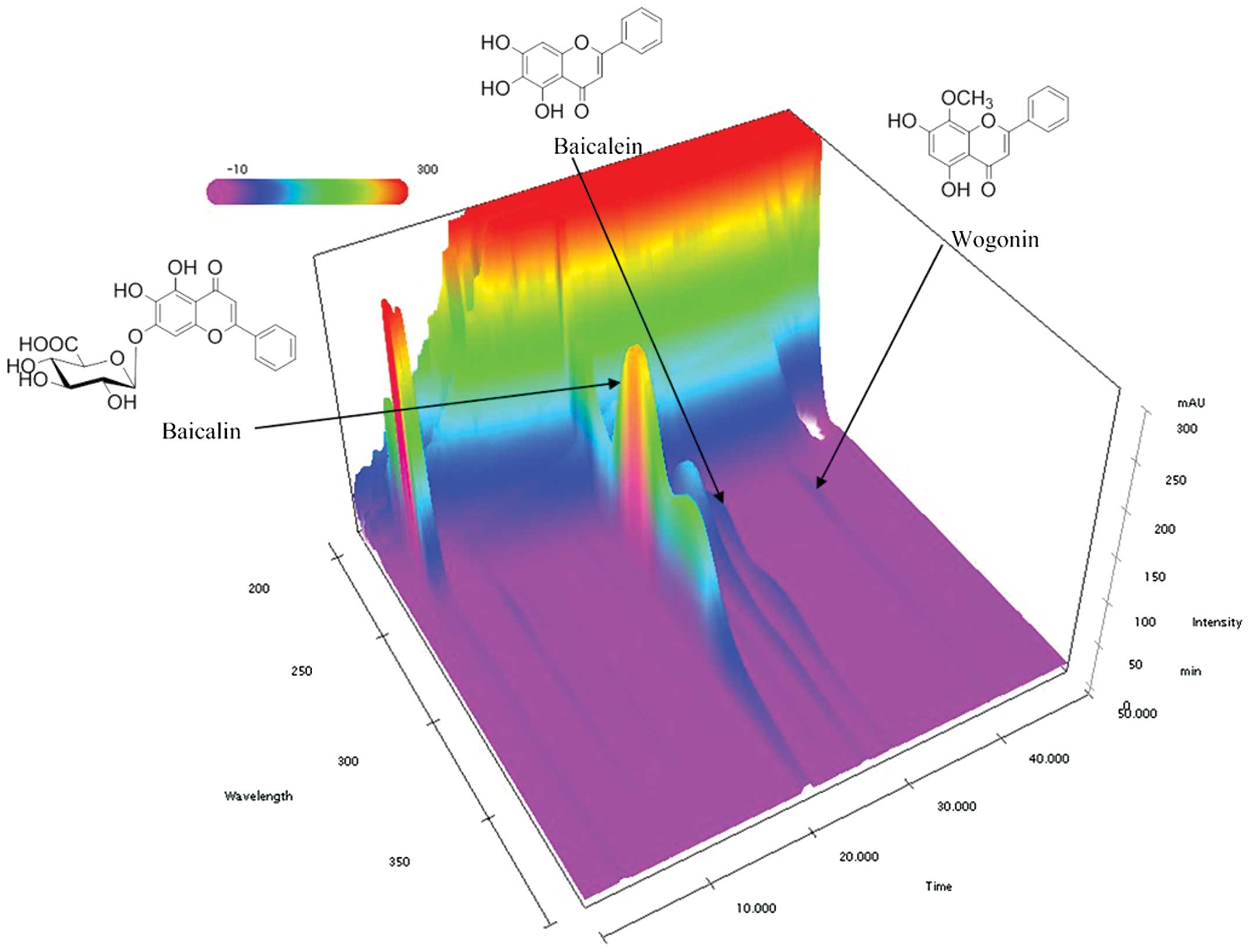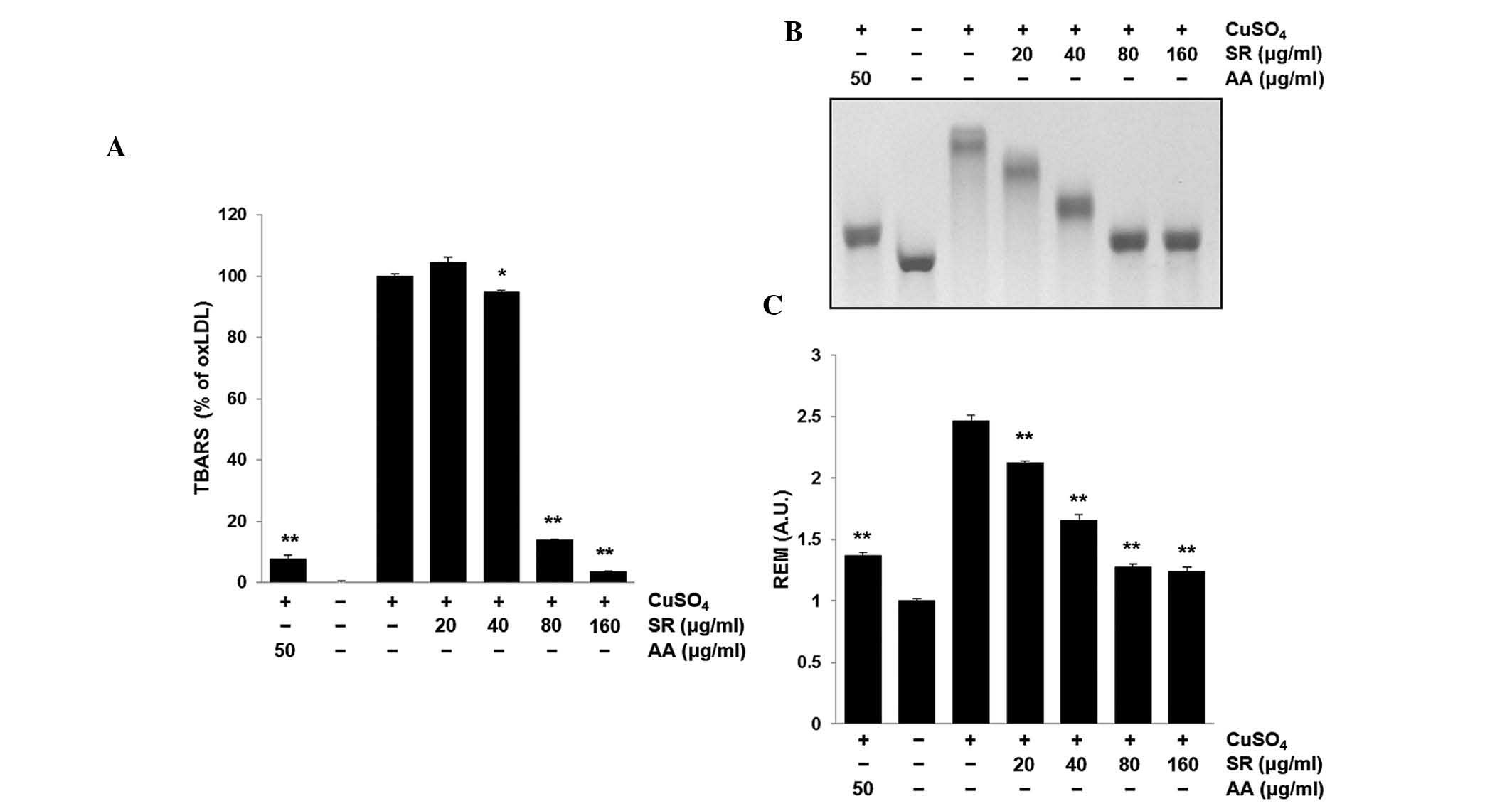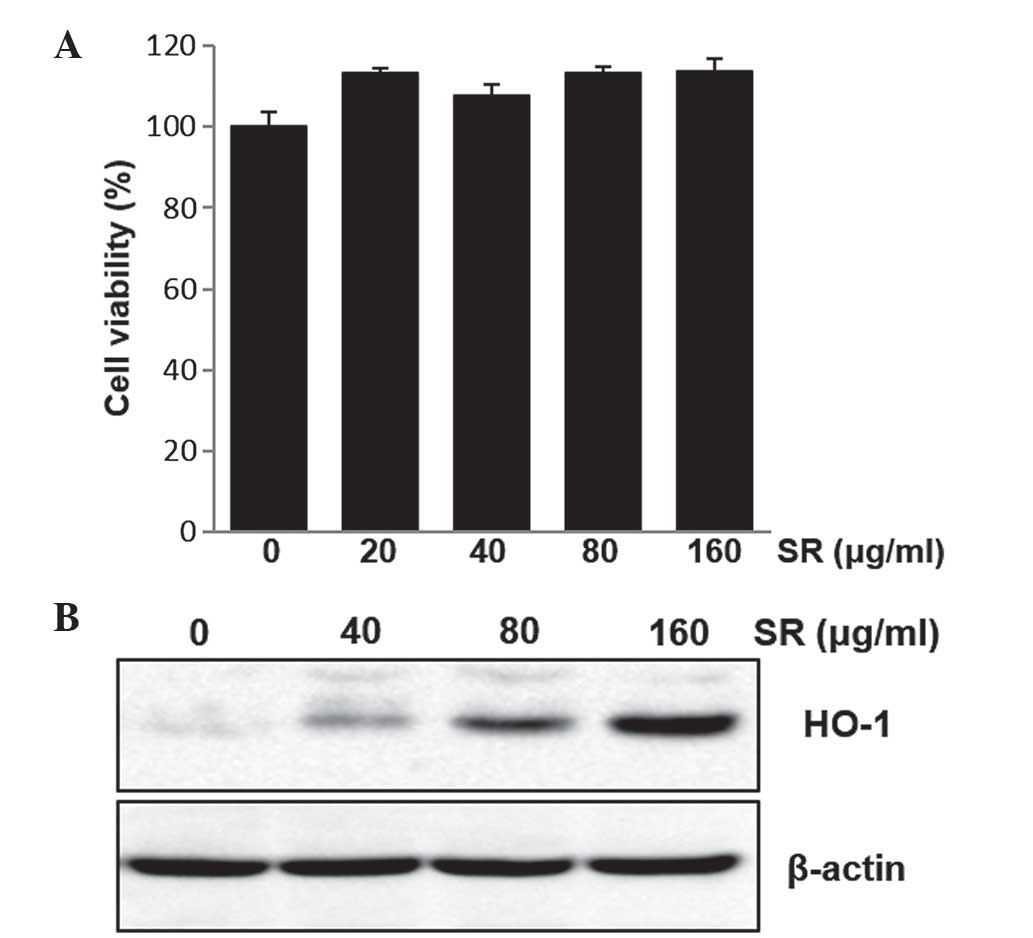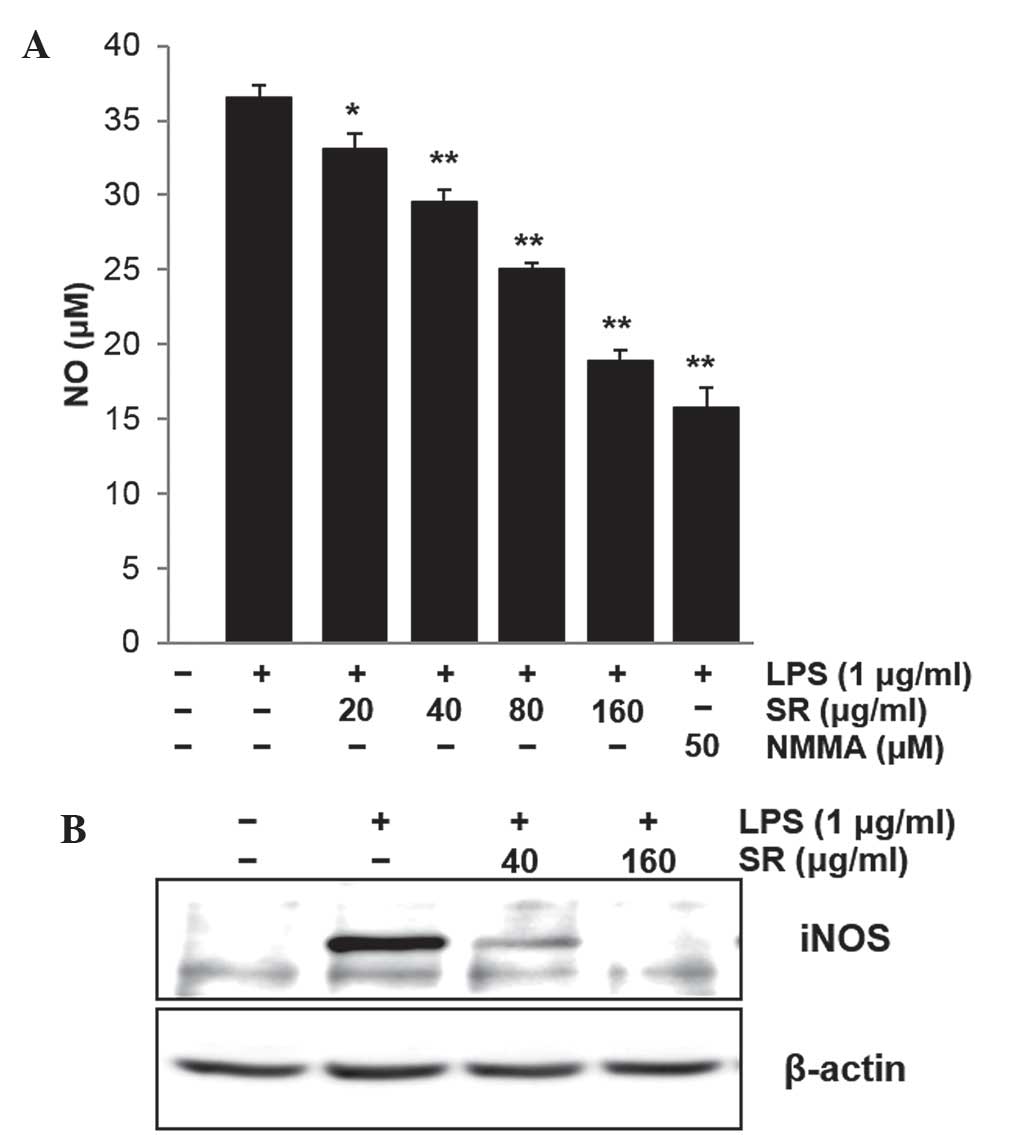|
1
|
Singh RB, Mengi SA, Xu YJ, et al:
Pathogenesis of atherosclerosis: A multifactorial process. Exp Clin
Cardiol. 7:40–53. 2002.PubMed/NCBI
|
|
2
|
Ross R: The pathogenesis of
atherosclerosis: a perspective for the 1990s. Nature. 362:801–809.
1993. View
Article : Google Scholar : PubMed/NCBI
|
|
3
|
Ross R: Atherosclerosis is an inflammatory
disease. Am Heart J. 138(5 Pt 2): S419–S420. 1999. View Article : Google Scholar : PubMed/NCBI
|
|
4
|
Tong L, Wan M, Zhang L, et al:
Simultaneous determination of baicalin, wogonoside, baicalein,
wogonin, oroxylin A and chrysin of Radix scutellariae extract in
rat plasma by liquid chromatography tandem mass spectrometry. J
Pharm Biomed Anal. 70:6–12. 2012. View Article : Google Scholar : PubMed/NCBI
|
|
5
|
Gao Z, Huang K, Yang X and Xu H: Free
radical scavenging and antioxidant activities of flavonoids
extracted from the radix of Scutellaria baicalensis Georgi. Biochim
Biophys Acta. 1472:643–650. 1999. View Article : Google Scholar : PubMed/NCBI
|
|
6
|
Park KI, Park HS, Kang SR, et al: Korean
Scutellaria baicalensis water extract inhibits cell cycle G1/S
transition by suppressing cyclin D1 expression and
matrix-metalloproteinase-2 activity in human lung cancer cells. J
Ethnopharmacol. 133:634–641. 2011. View Article : Google Scholar
|
|
7
|
Kumagai T, Müller CI, Desmond JC, et al:
Scutellaria baicalensis, a herbal medicine: anti-proliferative and
apoptotic activity against acute lymphocytic leukemia, lymphoma and
myeloma cell lines. Leuk Res. 31:523–530. 2007. View Article : Google Scholar
|
|
8
|
Jung HS, Kim MH, Gwak NG, et al:
Antiallergic effects of Scutellaria baicalensis on inflammation in
vivo and in vitro. J Ethnopharmacol. 141:345–349. 2012. View Article : Google Scholar : PubMed/NCBI
|
|
9
|
Kim EH, Shim B, Kang S, et al:
Anti-inflammatory effects of Scutellaria baicalensis extract via
suppression of immune modulators and MAP kinase signaling
molecules. J Ethnopharmacol. 126:320–331. 2009. View Article : Google Scholar : PubMed/NCBI
|
|
10
|
Maines MD: The heme oxygenase system: a
regulator of second messenger gases. Annu Rev Pharmacol Toxicol.
37:517–554. 1997. View Article : Google Scholar : PubMed/NCBI
|
|
11
|
Origassa CS and Câmara NO: Cytoprotective
role of heme oxygenase-1 and heme degradation derived end products
in liver injury. World J Hepatol. 5:541–549. 2013.PubMed/NCBI
|
|
12
|
Jansen T and Daiber A: Direct antioxidant
properties of bilirubin and biliverdin. Is there a role for
biliverdin reductase? Front Pharmacol. 3:302012.
|
|
13
|
Otterbein LE, Kolls JK, Mantell LL, et al:
Exogenous administration of heme oxygenase-1 by gene transfer
provides protection against hyperoxia-induced lung injury. J Clin
Invest. 103:1047–1054. 1999. View
Article : Google Scholar : PubMed/NCBI
|
|
14
|
Ryter SW, Alam J and Choi AM: Heme
oxygenase-1/carbon monoxide: from basic science to therapeutic
applications. Physiol Rev. 86:583–650. 2006. View Article : Google Scholar : PubMed/NCBI
|
|
15
|
Re R, Pellegrini N, Proteggente A, et al:
Antioxidant activity applying an improved ABTS radical cation
decolorization assay. Free Radic Biol Med. 26:1231–1237. 1999.
View Article : Google Scholar : PubMed/NCBI
|
|
16
|
Moreno MI, Isla MI, Sampietro AR and
Vattuone MA: Comparison of the free radical-scavenging activity of
propolis from several regions of Argentina. J Ethnopharmacol.
71:109–114. 2000. View Article : Google Scholar : PubMed/NCBI
|
|
17
|
Barnhart RL, Busch SJ and Jackson RL:
Concentration-dependent antioxidant activity of probucol in low
density lipoproteins in vitro: probucol degradation precedes
lipoprotein oxidation. J Lipid Res. 30:1703–1710. 1989.PubMed/NCBI
|
|
18
|
Buege JA and Aust SD: Microsomal lipid
peroxidation. Methods Enzymol. 52:302–310. 1978.PubMed/NCBI
|
|
19
|
Sparks DL and Phillips MC: Quantitative
measurement of lipoprotein surface charge by agarose gel
electrophoresis. J Lipid Res. 33:123–130. 1992.PubMed/NCBI
|
|
20
|
Wallin B, Rosengren B, Shertzer HG and
Camejo G: Lipoprotein oxidation and measurement of thiobarbituric
acid reacting substances formation in a single microtiter plate:
its use for evaluation of antioxidants. Anal Biochem. 208:10–15.
1993. View Article : Google Scholar : PubMed/NCBI
|
|
21
|
Chisolm GM and Steinberg D: The oxidative
modification hypothesis of atherogenesis: an overview. Free Radic
Biol Med. 28:1815–1826. 2000. View Article : Google Scholar : PubMed/NCBI
|
|
22
|
Charo IF and Taub R: Anti-inflammatory
therapeutics for the treatment of atherosclerosis. Nat Rev Drug
Discov. 10:365–376. 2011. View
Article : Google Scholar : PubMed/NCBI
|
|
23
|
Li AC and Glass CK: The macrophage foam
cell as a target for therapeutic intervention. Nat Med.
8:1235–1242. 2002. View Article : Google Scholar : PubMed/NCBI
|
|
24
|
Andrés V: Control of vascular cell
proliferation and migration by cyclin-dependent kinase signalling:
new perspectives and therapeutic potential. Cardiovasc Res.
63:11–21. 2004. View Article : Google Scholar : PubMed/NCBI
|
|
25
|
Heinecke JW: Lipoprotein oxidation in
cardiovascular disease: Chief culprit or innocent bystander? J Exp
Med. 203:813–816. 2006. View Article : Google Scholar : PubMed/NCBI
|
|
26
|
Norata GD, Tonti L, Roma P and Catapano
AL: Apoptosis and proliferation of endothelial cells in early
atherosclerotic lesions: Possible role of oxidised LDL. Nutr Metab
Cardiovasc Dis. 12:297–305. 2002.
|
|
27
|
Libby P, Ridker PM and Maseri A:
Inflammation and atherosclerosis. Circulation. 105:1135–1143. 2002.
View Article : Google Scholar : PubMed/NCBI
|
|
28
|
Li C, Zhou L, Lin G and Zuo Z: Contents of
major bioactive flavones in proprietary traditional Chinese
medicine products and reference herb of Radix Scutellariae. J Pharm
Biomed Anal. 50(3): 298–306. 2009. View Article : Google Scholar : PubMed/NCBI
|
|
29
|
Akagiri S, Naito Y, Ichikawa H, et al:
Bofutsushosan, an Oriental herbal medicine, attenuates the weight
gain of white adipose tissue and the increased size of adipocytes
associated with the increase in their Expression ef uncoupling
protein 1 in high-fat diet-fed male KK/Ta mice. J Clin Biochem
Nutr. 42:158–166. 2008. View Article : Google Scholar : PubMed/NCBI
|
|
30
|
Tanaka K, Nara K, Nishimura T, et al:
Fever of unknown origin successfully treated by oren-gedoku-to
(huanglian-jie-du-tang). Int J Gen Med. 6:829–832. 2013. View Article : Google Scholar : PubMed/NCBI
|
|
31
|
Ho FM, Liao YH, Yang AJ, et al:
Anti-atherosclerotic action of Ger-Gen-Chyn-Lian-Tang and
AMPK-dependent lipid lowering effect in hepatocytes. J
Ethnopharmacol. 142:175–187. 2012. View Article : Google Scholar : PubMed/NCBI
|
|
32
|
Ji YY, Liu JT, Wang ZD, et al: Study on
anti-atherosclerotic mechanisms of divided functional recipes of
dahuang zhechong pill in rabbits. China J Chin Mater Med.
32:1077–1081. 2007.In Chinese.
|
|
33
|
Ji YY, Liu JT and Li JL: Effect of the
disassembled recipes of dahuang zhechong pill on proliferation and
apoptosis of vascular smooth muscle cells in atherosclerotic
rabbits. Chin J Integr Tradit West Med. 26:913–917. 2006.In
Chinese.
|
|
34
|
Sekiya N, Kainuma M, Hikiami H, et al:
Oren-gedoku-to and Keishi-bukuryo-gan-ryo inhibit the progression
of atherosclerosis in diet-induced hypercholesterolemic rabbits.
Biol Pharm Bull. 28:294–298. 2005. View Article : Google Scholar : PubMed/NCBI
|
|
35
|
Kimura Y, Kubo M, Kusaka K, et al: Studies
on Scutellariae radix. V Effects on ethanol-induced hyperlipemia
and lipolysis in isolated fat cells. Chem Pharm Bull (Tokyo).
30:219–222. 1982. View Article : Google Scholar
|
|
36
|
Kimura Y, Okuda H, Taira Z, et al: Studies
on Scutellariae radix. IX. New component inhibiting lipid
peroxidation in rat liver. Planta Med. 50:290–295. 1984. View Article : Google Scholar : PubMed/NCBI
|
|
37
|
Girotti AW: Lipid hydroperoxide
generation, turnover and effector action in biological systems. J
Lipid Res. 39:1529–1542. 1998.PubMed/NCBI
|
|
38
|
Napoli C and Ignarro LJ: Nitric oxide and
atherosclerosis. Nitric Oxide. 5:88–97. 2001. View Article : Google Scholar : PubMed/NCBI
|
|
39
|
Morita T: Heme oxygenase and
atherosclerosis. Arterioscler Thromb Vasc Biol. 25:1786–1795. 2005.
View Article : Google Scholar : PubMed/NCBI
|
|
40
|
Liu D, He Z, Wu L and Fang Y: Effects of
induction/inhibition of endogenous heme oxygenase-1 on lipid
metabolism, endothelial function and atherosclerosis in rabbits on
a high fat diet. J Pharmacol Sci. 118:14–24. 2012. View Article : Google Scholar
|
|
41
|
Wu ML, Ho YC, Lin CY and Yet SF: Heme
oxygenase-1 in inflammation and cardiovascular disease. Am J
Cardiovasc Dis. 1:150–158. 2011.
|


















